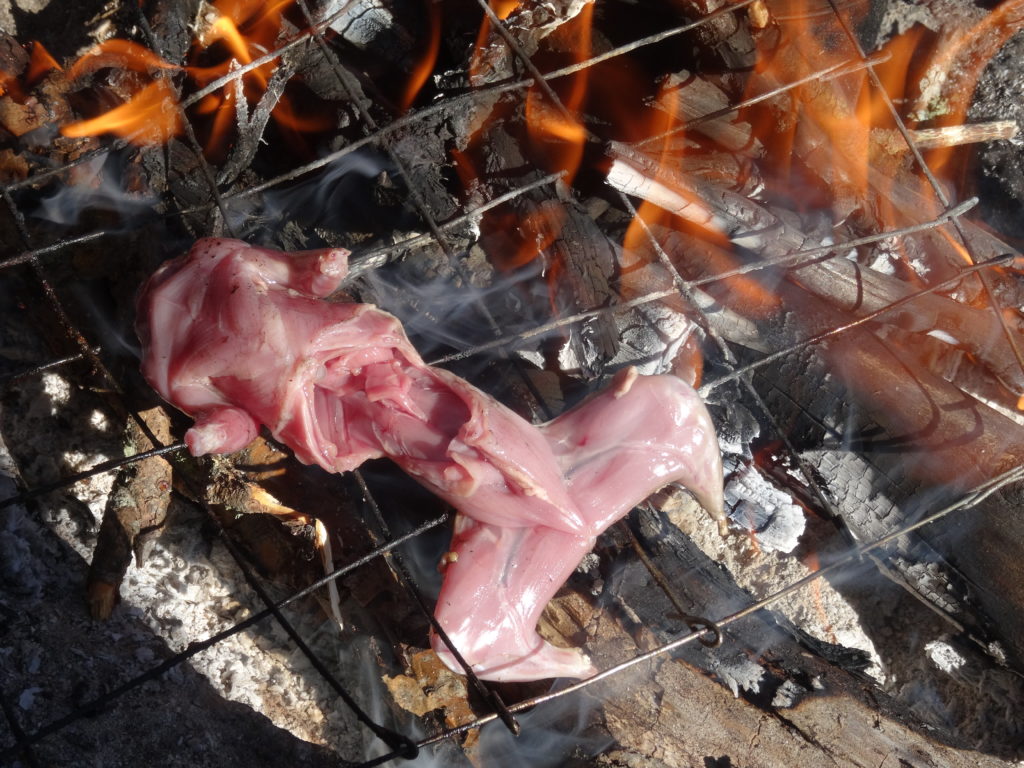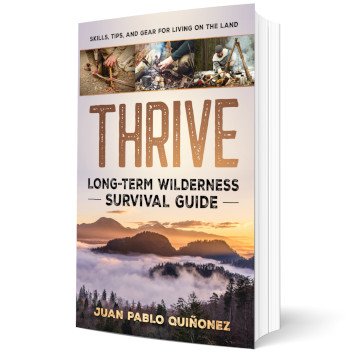It is impossible to prepare our mind completely for an adventure, because adventure is the pursuit of the unknown. Nevertheless, we process everything through our mind, and it is essential to have the right mindset in order to venture out of our comfort zone and find what we are looking for. I will expand on some of the strategies I have learned and used effectively throughout my life.
Stay Present, in the Moment
During our stay in the woods, my partner and I had many hard times. Everything in nature is cyclical; some days we caught fish and some days we didn’t. We lost a lot of weight in the first months; I lost around 30 pounds. Needless to say, we longed for food. We often dreamt of food. I even had a few hallucinations, were I would smell homemade food in the middle of the forest. We had forbidden ourselves from talking about food, other than the food we could access to. We couldn’t talk about pizza or cheese, just fish, rice, bread, berries etc. It was challenging to stay in the moment and be content with what we had.
The grass is always greener on the other side
Being in the present is required to be happy, mindful, and content. When we were in the forest we often missed having abundant food, warm clothing, music, or friends and family. We knew civilization has its benefits but the wilderness has many benefits too. One of the challenges we had was to stay in the present and enjoy the moment rather than think about the future or the past. We would think about the irony of longing to be in civilization when we knew that we would long to be in the wilderness in the future. Longing for different circumstances is a trap that I find many of us habitually fall in.
“Such as are your habitual thoughts, such also will be the character of your mind; for the soul is dyed by the thoughts” Marcus Aurelius
 You are what you think, feel, speak, act, and focus your attention upon
You are what you think, feel, speak, act, and focus your attention upon
I brought Cody Lundin’s When all Hell Breaks Loose on our adventure. I really liked the chapter with the same headline as this paragraph. Cody explains that using our ability to think, feel, speak, act, and focus our attention, we can shape our own reality. Our mind processes the input from our senses and translates them into a construct that we call reality. We all are different, and we experience reality differently. We can think of the mind like a lens. The properties of the lens act like a filter and change the light that passes through.
Similarly, the habits of our mind interact with our experiences to form our own reality. If we mostly act positively, naturally, some positive actions will bounce back at us. Similarly the things we focus our attention on will have an effect in the way we think.
Another way to put it is to image two dogs. We’ll pretend these dogs exist in another realm of reality. One dog feeds off positive thoughts, actions, words, feelings etc. And the other dog feeds off the negative thoughts, actions, words, feelings. Any time your mind feeds a dog, the dog grows stronger. This exercise helps one steer their mind to a positive direction.

“A journey of a thousand miles begins with a single step” Lao Tzu
Take it day by day, meal by meal, step by step
The bigger and harder a challenge is, the more it helps to separate it into smaller stages. In our adventure sometimes we had to take things slowly and focus on progressing day by day. It took us two days to get all our equipment at the other end of the 5km Obukowin portage. It was a very hard portage so we divided it into smaller stages. When basic training gets really hard physically and mentally, many soldiers split the day in stages that go meal by meal.
In many survival stories the protagonists have to mentally partition their journeys, and take them step by step or even inch by inch. One focuses on reaching the next bend of the river, and then when one reaches the bend, one sets another bend as a goal. This partitioning helps break an overwhelming objective into various smaller, reasonable objectives that our mind can deal with.
Will Power is a limited resource, act accordingly
Will Power is like a muscle, you can exercise it to make it stronger. But Will Power has limitations just like a muscle. If you keep your muscle flexed for a long enough period of time it will inevitably stop exerting power. When we were in the wilderness we suffered chronic hunger and some days were not enjoyable. If there had been a pizza place nearby we would have eaten there.
When I was younger I walked outside my apartment on a winter night towards a nearby forest. My intention was to practice survival skills by sleeping outside with just some clothes and a lighter. In the middle of the night my mind had convinced myself to walk back to my apartment. After all it was a short trip back. I had given in to my cravings for comfort because my will power is limited and the comfort was easily accessible.
Taking in consideration that will power is limited, we set the rule that if we wanted to get back to civilization (and it was no emergency) we would wait three days to reassess in order to prevent making an impulsive choice. We never seriously considered going back before our goal of 6 months, but being at least six long hard days away from the nearest road definitely helped reduce the temptation. It is much easier to be committed to something if there is no easy way out.
Remember to breathe
I learned that doing breathing cycles slowly focuses my attention in the moment and resets my mind while calming me. I inhale for a 4 second count and hold my breath for another 4 seconds. Then I exhale for 4 seconds, hold my breath for 4 seconds, and start the cycle again. If I do three or four sets I feel my mind-body transition into a calmer state. I often do this breathing cycles before doing something out of my comfort zone or if my mind is altered. I learned this technique from the book The Way of the SEAL
![]()
My partner meditated for twenty minutes every day we were out there. Focusing on my breathing while meditating helps calm my mind and strengthen my power of concentration. You can count your breaths to ten and start again to make it easier at the start. As you progress you can focus on the sensation of breathing or imagine air travelling as you breathe. I recommend meditation to anyone experiencing challenging times.
Motivation is for amateurs
I feel motivation is cyclical. Sometimes I feel motivated and sometimes I do not. Before our adventure I gathered motivational quotes that I have been collecting. I printed and laminated them to have them at our tent. Every day my partner and I would read a quote at the start of the day. Quotes help me remember why I am doing something, and remind me that gaining valuable things takes work and persistence. We also brought a list of reasons to be there; it stated the purpose of our adventure.
Another great motivation for us was the book Alive: The Story of the Andes Survivors. We would look forward to reading it every night. It is about the Uruguayan rugby team that crashed in the Andes in the 70’s. It is an excellent read. I highly recommend it to anyone that likes survival stories. The survivors experienced unimaginable hardships. Reading about their experiences gave us courage and perspective. Even though some days were hard we knew we had it super easy in comparison to what the survivors experienced in Alive. I highly recommend taking inspirational, true stories with you during challenging adventures.



